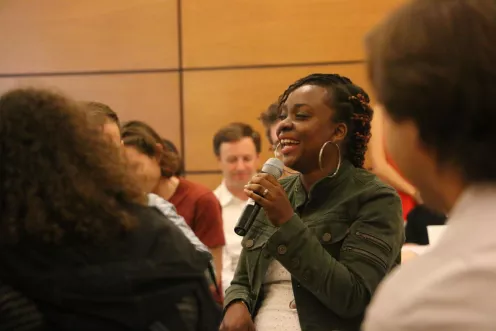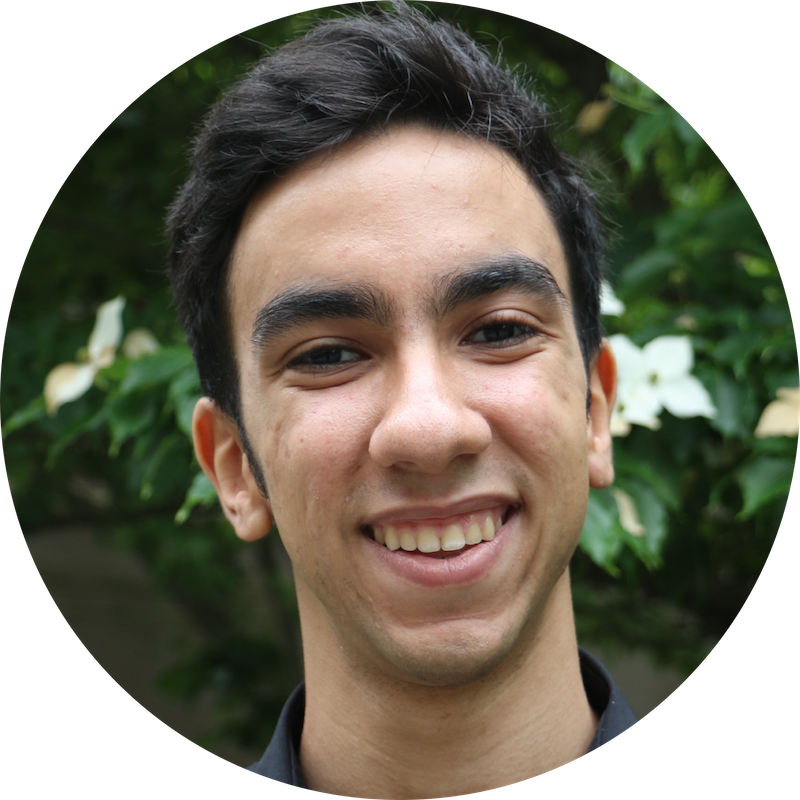
Get to Know Berkman Klein Fellow Titi Akinsanmi
a spotlight on one of our 2018-2019 BKC Fellows


by Mehdi Khrichfa & Hugh Jones
This interview is part of a collaborative effort between the summer 2018 BKC interns and the Communications team to showcase the tremendous work and backgrounds of our 2018 -'19 BKC fellows.
After spending as much as a few minutes conversing with Titi Akinsanmi (BKC Fellow 2018-2019), it’s hard to resist getting swept away by her passion, excitement and deep-rooted optimism regarding her work and the interconnected, multifaceted environment she’s impacting. We were incredibly lucky to get the chance to connect with Titi earlier this month and discuss a number of topics pertaining to some of her past efforts as well as her hopes for her fellowship at the Berkman Klein Center.
Our conversation touched on the nuances of issues such as privacy, fair use, and the continued evolution of the Internet in both developed and emerging digital economies. Through it all, we were tremendously inspired by Titi’s pragmatic belief in the perseverance of the human spirit and were reminded once again of all the wonderfully transformative possibilities that are created and facilitated when people connect and engage on the open Internet.
Below are edited excerpts containing some of the most salient discussions from our interview. We are most grateful to Titi for taking the time to share her thoughts and perspective with us and to Rebecca Tabasky at the Berkman Klein Center for connecting us to her!
Read more stories from our Interns and Fellows!
Mehdi: Out of curiosity, why did you choose the Berkman Klein Center and what inspired you to apply for a fellowship here?
It would have to track back all the way to the beginning of Berkman Klein where I heard about its establishment and thought “in about 15 years or so I will think about looking into this opportunity.” My applying was very much driven by the fact that I am at a point in my career where I have started using the phrase: “I want to use my brain more…”
My motto in life is “dubito, ergo cogito, cogito ergo sum.” That’s Latin for “I doubt therefore I think, I think therefore I am.” My ability to be and to be able to fulfill my work — my passion — is very much dependent on my capacity to be able to think through and understand. And inasmuch as that says “I think therefore I am,” it is bounded by another lovely principle I believe in, which is the Ubuntu principle: “I can only be who I am by virtue of the community I am in or by virtue of the people who surround me”.
I like to be to be able to walk through what I’m focused on at any point in time with the help of those around me. If you transpose this with my interest in technology, the digital economy, the Internet and the Information Society, as well as the many things that we are currently working through — be it privacy, be it copyright or intellectual property issues, be it data governance, whatever it is — I believe that your ability to actively contribute and to shape that is very much dependent on a sound thought process.
Having been an external observer to the work that has been done by Berkman Klein, I know it sits in a good neutral position for me to be able to do that. And if you track back to how I started — I was leading the World Summit on the Information Society’s youth caucus at that point in time — I realized that, when I reach the point in my career where I have enough experience, I want to be able to be a part of a center that's very much focused on and dedicated to helping the world to come into grasp with this “ungraspable” initiative or space that is the world of the Internet.
I realized that, when I reach the point in my career where I have enough experience, I want to be able to be a part of a center that's very much focused on and dedicated to helping the world come to grasp with this “ungraspable” initiative or space that is the world of the Internet.
I’m excited for the opportunity to convene thinking spaces where our goal is to work through — leaving our egos outside, hopefully — how best to respond to the challenges that we are being presented with across the board. And I’m coming at it with no presumptions around being an expert in the space. I’m coming, again, to think, to learn, and hopefully to be able to produce and share with the rest of the world.
Hugh: Could you tell us a bit more about yourself, your background and how your interests developed?
My first degree is in English. My interest in technology came about because I was insulted: I was perceived by someone as being unable to understand or grasp technology because I’m female. And in a way, I appreciate it. It is sometimes out of the moments when you feel most discouraged that you actually identify an opportunity. I was in my final year of University, and a series of occurrences had taken place that helped me realize that I didn’t have enough of a grasp on the technology space.
We're talking about the year 2000 when we had the Y2K bug. We thought “everything is going to change, everything might collapse.” I realized, "wait a minute! If I am so connected and jazzed up yet feel disconnected, how much more might folks who are not even aware of this conversations?" And that fired me up — that fire was about being able to take what was then labeled as Information and Communications Technology (ICT skills) and use that — my skill set — to train as many people as would be willing to listen to me.
In doing that, I increasingly came across a stumbling block in the shape of government. The stumbling block I identified is that the governments (the policies and the regulations that were in place at the time) were ill-prepared to take advantage of or to harness the opportunities of technology… This very much began to influence a lot of the work that I did around helping governments organize, understand, and rightly place themselves in what is now termed the “digital economy.” I have been working in the sector for about 18 years now and have reached a point where I would describe myself as a "non-techie techie." I understand the guys who get the technology, who are developing it, etc. enough (more than enough, actually) to interpret them for the rest of the world to understand.
Mehdi: What do you think of Julian Assange’s statement that privacy is dead and we have to start thinking of how to live in a society without privacy?
Privacy will be dead when human beings cease to take control of their own lives, their own space. Privacy will be dead when human rights are dead. So that gives you an answer already: are human rights dead? No. Rather, I believe that the notion of privacy will consistently shift, depending on the context, the person, and the technology, depending particularly on the user, or the person, or the individual's ability to grasp and understand what they need to give up — if anything at all — to be able to make use of technology.
So with due respect, Assange: No! Privacy is not dead, but rather our understanding of privacy in the digital age needs to be better understood by each individual end user. And that can be helped by governments, by businesses, by academia. We need to help human beings, our race, better understand what it is that we need to give or take.
Hugh: You’ve talked about how everyone has a different idea of privacy and it has obviously cultural differences, generational differences, etc. What do you think that corporations, governments, and academic institutions can do to try to reconcile this differences? What do you think the starting point is for that?
The starting point is to learn to listen to each other better, sincerely. There's chaos when it comes to it sometimes: everybody wants to be on the side of right. Trust is very much easily broken in this space as well, so that does give me concern.
The starting point is learn to listen to each other better, sincerely. There's chaos when it comes to it sometimes: everybody wants to be on the side of right.
What else can we do? Give the benefit of the doubt. I'm giving you intentionally humane responses because in order to address this we cannot come at this from a technological response. A technical response can only emerge once we have utterly engaged as the humans that we are. For us to be able to respond — to find that right space — we need to have and agree on a firm set of principles: what is non-negotiable around that issue, on the one hand, and then the technology response can adapt to that.
Hugh: You talked about how we have to have humanity and humanism driving our technology. How good a job have we done, in your opinion, at keeping a human perspective as we develop these things?
There's a slide that I use when I teach on the Information Society that has a rabbit and a tortoise. The rabbit is technology and the tortoise is the regulatory environment. Somewhere along the line, we are there as humans. Technology will always be at the forefront of policymaking. But — because it's humans that drive both — if you help people learn the right sets of skills (such that when they are developing technologies they adhere to the right set of ethical and moral codes internally) then it’s not as hard to catch up.
Are we doing a great job? We can always do a better job because inasmuch as we have great minds developing new technology, they are not necessarily thinking through the entire process until the technology is already at play. And that’s why we have test situations. So the regulatory environment will always try to catch up. It does eventually because the rabbit has speed, but the tortoise has stamina. But just ensuring that the ecosystem actually continues to be supported — that we don’t lose sight of our humanity in the midst of a digital technological revolution — is key.
So the regulatory environment will always try to catch up. It does eventually, because the rabbit has speed, but the tortoise has stamina. But just ensuring that the ecosystem actually continues to be supported — that we don’t lose sight of our humanity in the midst of a digital technological revolution — is key.
Mehdi: Speaking of fair use, we recently faced a serious threat to fair use in Europe with article 13 of the new copyright directive proposal. How do you feel about the right to fair use in emerging digital economies?
My response to that is going to be very short: fair use is non-negotiable. For us to have a thriving digital economy the erosion of the principles around fair use cannot be negotiated. Having stringent rules in place that prevent us from being able to copy and reuse respectfully clamps down on a critical or innate part of every human being... Are we going to say that we are going to be consistently checking ourselves? It’s a question. That said, inasmuch as we need to bring the copyright regime into this century, literally, it needs to be done in a very thoughtful way and in a similar way that the industrial revolution happened and there was a change, we need to help particular industries that feel under threat by the Internet. We need to help them adapt and change. And I believe there are processes in place that are currently looking into that as well.
Mehdi: You’ve said that everyone benefits from a thriving digital economy. Why do you think governments aren’t making more meaningful investments in building better Internet infrastructure, especially in emerging economies, but in every country?
Everyone benefits from a thriving digital economy. But there’s always a good and bad consequence to the adoption of new technologies. Why are governments not investing in infrastructure that ensures equitable access? It’s because digital infrastructure consists of resources that they have competing priorities for. So in a lot of emerging digital economies you still have a significant difference in the state of cities and what is more often than not called the countryside — infrastructure has not been equitably distributed. Increasingly, a lot more of the emerging countries’ governments are trying to address this. If I stick to the African continent, if you look at the positions that have been taken such as African Union’s Agenda 2063, if I have it correct, it’s very much focused around being able to look at the digital economy and ask how do we reallocate resources in a way that we are responding to present needs, but at the same time ensuring that we are preparing for the opportunities that emerge in the future. So there’s some thinking around that, but we still need to spend more time addressing this as well.
Read more about our Open 2019 - '20 Fellows Call for applications!
Interviewers
Hugh Jones
Hugh Jones is a student at the University of Virginia and is deeply interested in the manner in which technology is impacting politics and society at large. At the Berkman Klein Center, Hugh worked as an intern on the Ethics and Governance of AI initiative during the summer of 2018.
Mehdi Khrichfa
Mehdi Khrichfa is a Computer Engineering student at "Politecnico di Torino", in Italy, interested in programming and game development. He worked on the Network of Centers Knowledge Platform during the summer of 2018.